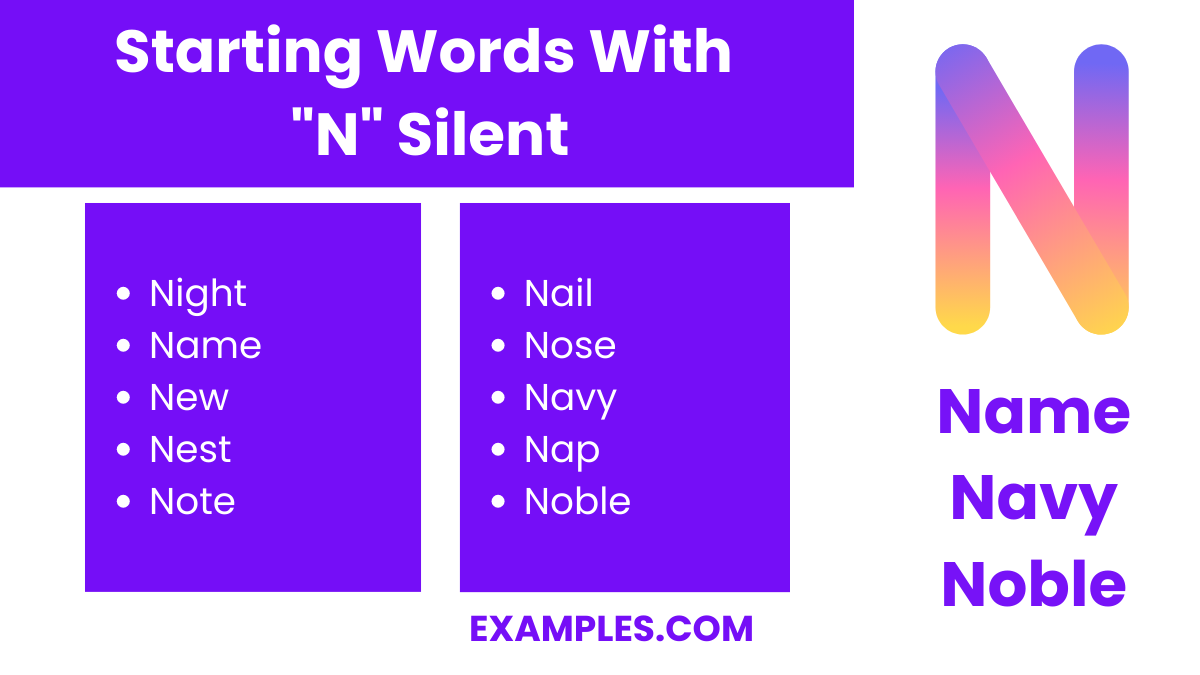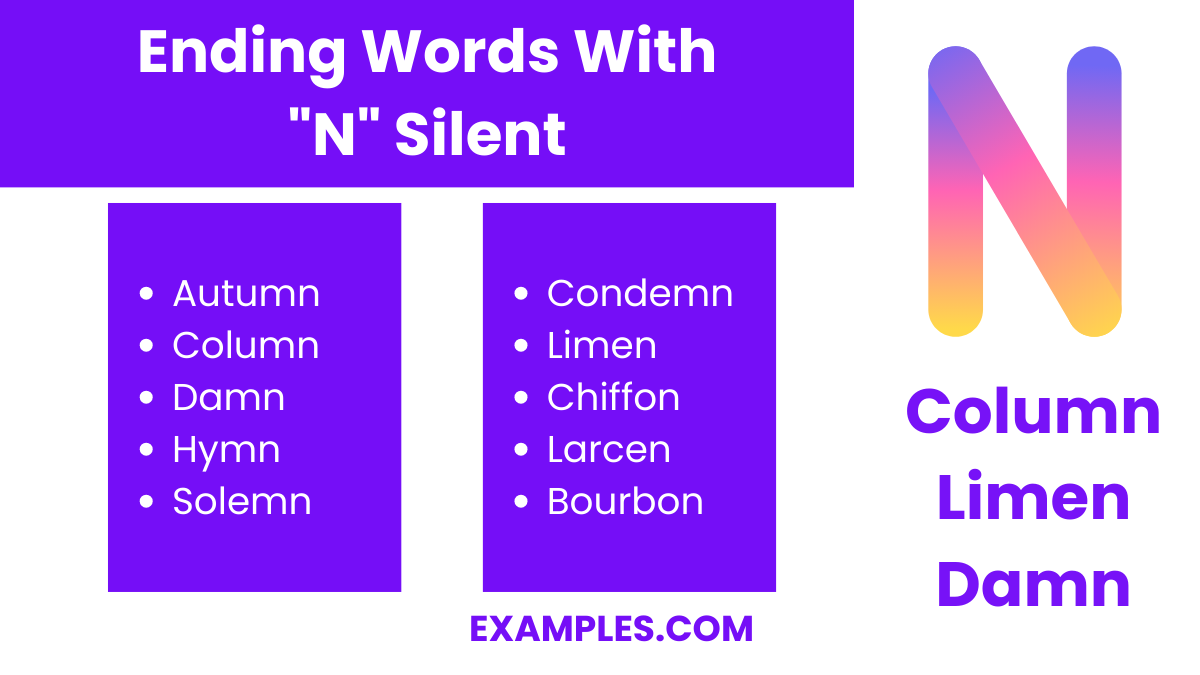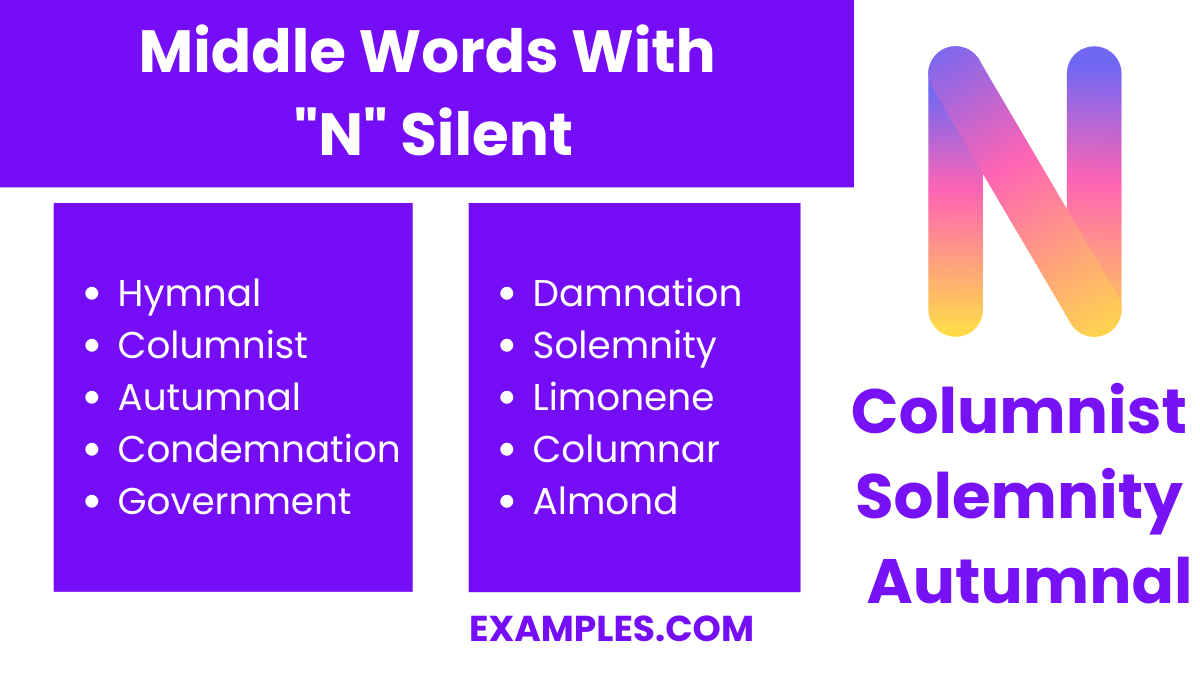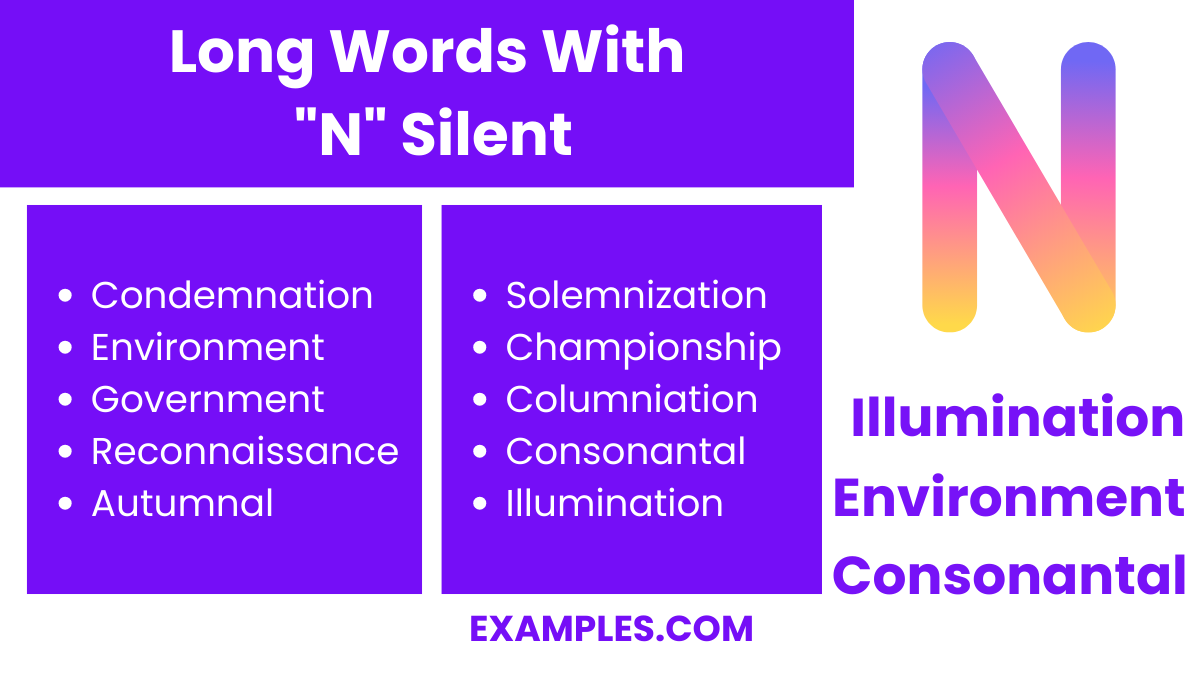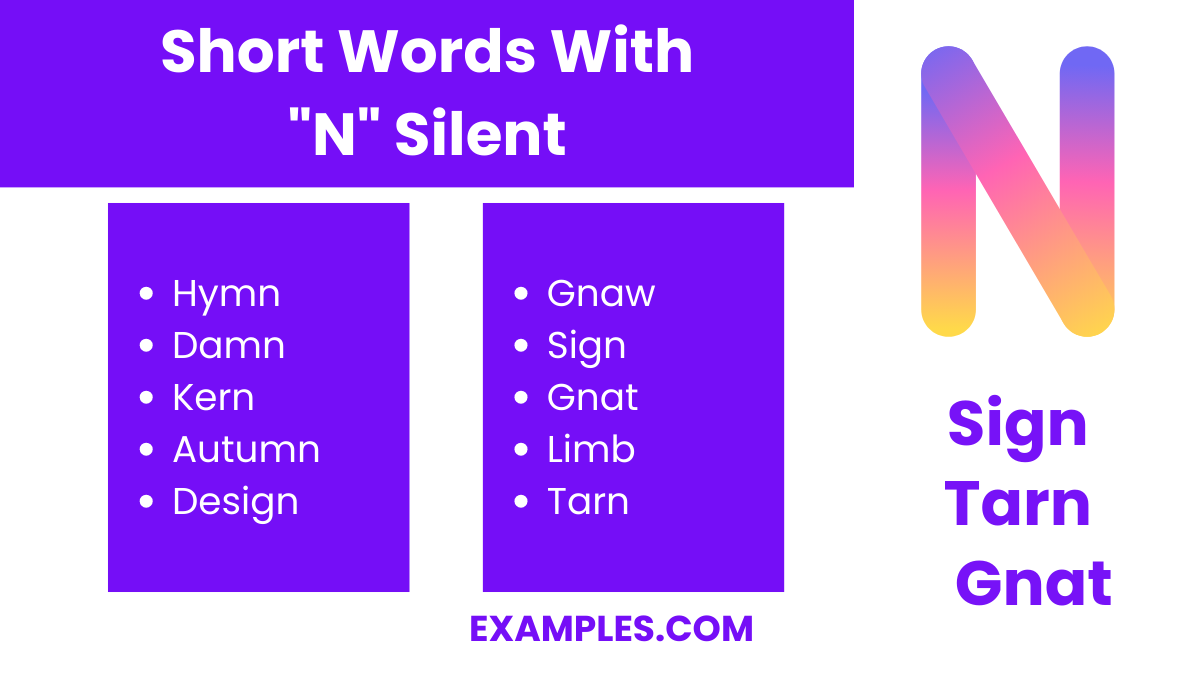450+ N Silent Words List, Meaning, PDF
In the labyrinth of English phonetics, silent “N” words stand as subtle sentinels, challenging the conventions of pronunciation. These words, where the “N” whispers its presence without a sound, offer a fascinating peek into the history and evolution of the language. This compilation unveils the enigmatic world of silent “N” words, inviting you to explore their quiet elegance. Delve into this linguistic anomaly to enhance your understanding and appreciation of English’s rich tapestry.
Download Most Commonly Used N Silent Words - PDF
30+ Most Commonly used “N” Silent Words
Exploring silent “N” words unveils a fascinating aspect of Daily Use English Words, where the “N” remains unvoiced, enriching the language’s complexity and nuance. This collection, aimed at educators and learners, enhances phonetic understanding and vocabulary. Mastering these words can significantly improve pronunciation and comprehension, providing insight into English’s diverse linguistic heritage. Each word is a portal to linguistic intricacy, offering a unique challenge to those keen on delving deeper into language mastery. This list is an invaluable resource for expanding one’s linguistic repertoire and understanding the subtle dynamics of English phonetics.
| Word | Phonetic Pronunciation |
|---|---|
| Autumn | ˈɔːtəm |
| Column | ˈkɒləm |
| Condemn | kənˈdɛm |
| Damn | dæm |
| Hymn | hɪm |
| Solemn | ˈsɒləm |
| Government | ˈɡʌvərmənt |
| Environment | ɪnˈvaɪrənmənt |
| Assign | əˈsaɪn |
| Design | dɪˈzaɪn |
| Resign | rɪˈzaɪn |
| Align | əˈlaɪn |
| Benign | bɪˈnaɪn |
| Malign | məˈlaɪn |
| Consign | kənˈsaɪn |
| Foreign | ˈfɒrɪn |
| Reign | reɪn |
| Feign | feɪn |
| Sign | saɪn |
| Campaign | kæmˈpeɪn |
| Champagne | ʃæmˈpeɪn |
| Sovereign | ˈsɒvrɪn |
| Deign | deɪn |
| Fain | feɪn |
| Cocaine | kəʊˈkeɪn |
| Constrain | kənˈstreɪn |
| Contain | kənˈteɪn |
| Detain | dɪˈteɪn |
| Entertain | ˌɛntəˈteɪn |
| Explain | ɪkˈspleɪn |
| Ordain | ɔːˈdeɪn |
| Pertain | pəˈteɪn |
| Rain | reɪn |
| Obtain | əbˈteɪn |
| Retain | rɪˈteɪn |
| Sustain | səˈsteɪn |
| Train | treɪn |
| Certain | ˈsɜːtən |
| Fountain | ˈfaʊntɪn |
| Mountain | ˈmaʊntɪn |
| Fountain | ˈfaʊntɪn |
| Curtain | ˈkɜːtən |
| Captain | ˈkæptɪn |
| Chaplain | ˈtʃæplɪn |
| Campaign | kæmˈpeɪn |
| Champagne | ʃæmˈpeɪn |
| Sovereign | ˈsɒvrɪn |
| Deign | deɪn |
| Fain | feɪn |
| Cocaine | kəʊˈkeɪn |
| Constrain | kənˈstreɪn |
| Contain | kənˈteɪn |
| Detain | dɪˈteɪn |
| Entertain | ˌɛntəˈteɪn |
| Explain | ɪkˈspleɪn |
| Ordain | ɔːˈdeɪn |
| Pertain | pəˈteɪn |
| Rain | reɪn |
| Obtain | əbˈteɪn |
| Retain | rɪˈteɪn |
| Sustain | səˈsteɪn |
| Train | treɪn |
| Certain | ˈsɜːtən |
| Fountain | ˈfaʊntɪn |
| Mountain | ˈmaʊntɪn |
| Fountain | ˈfaʊntɪn |
| Curtain | ˈkɜːtən |
| Captain | ˈkæptɪn |
| Chaplain | ˈtʃæplɪn |
Starting Words With “N” Silent
Discover the subtleties of English with words where the “N” is silently poised at the start, a characteristic that often traces back to ancient languages. This list is a crucial tool for educators aiming to deepen students’ understanding of English phonetics and expand their vocabulary. Engaging with these examples, including rhyming words with silent “N”, allows for exploration of the language’s silent intricacies. This approach enriches learning, making the study of English phonetics both fascinating and insightful.
- Night (/naɪt/) – The period of darkness between sunset and sunrise.
- Name (/neɪm/) – A word or set of words by which a person, animal, place, or thing is known, addressed, or referred to.
- New (/njuː/ or /nuː/) – Not existing before; made, introduced, or discovered recently or now for the first time.
- Nest (/nɛst/) – A structure or place made or chosen by a bird for laying eggs and sheltering its young.
- Note (/noʊt/) – A brief record of facts, topics, or thoughts, written down as an aid to memory.
- Nail (/neɪl/) – A small metal spike with a broadened flat head, driven into wood to join things together or to serve as a hook.
- Nose (/noʊz/) – The part of the face or head through which a person or animal smells and breathes.
- Navy (/ˈneɪ.vi/) – The branch of a nation’s armed services that conducts military operations at sea.
- Nap (/næp/) – A short sleep, especially during the day.
- Noble (/ˈnoʊ.bəl/) – Belonging by rank, title, or birth to the aristocracy; showing fine personal qualities or high moral principles.
Ending Words With “N” Silent
Venture into the realm where the silent “N” concludes words, crafting a distinctive ending that often goes unnoticed. This selection, particularly focusing on praising words, is tailored for teachers to enrich their lesson plans. It offers students a unique perspective on word endings and pronunciation rules in English, shedding light on the language’s diverse phonetic landscape. By integrating these words into their curriculum, educators can provide a deeper understanding of English’s nuances, fostering a more comprehensive grasp of its intricacies.
- Autumn (ˈɔːtəm) – The season after summer and before winter.
- Column (ˈkɒləm) – A vertical structure used as a support or a decorative element in architecture.
- Damn (dæm) – Used to express anger or frustration.
- Hymn (hɪm) – A religious song or praise.
- Solemn (ˈsɒləm) – Formal and dignified; not cheerful or smiling.
- Condemn (kənˈdɛm) – Express complete disapproval of, typically in public.
- Limen (ˈlaɪmən) – The threshold of a physiological or psychological response.
- Chiffon (ʃɪˈfɒn) – A light, sheer fabric typically made of silk or nylon.
- Larcen (ˈlɑːrsən) – A less common form of the word ‘larceny’, meaning theft of personal property.
- Bourbon (ˈbɜːrbən) – A type of American whiskey.
Middle Words With “N” Silent
Embark on an exploration of consonant words with a silent “N” nestled in their heart. These examples offer a fascinating glimpse into the complexity of English pronunciation, making them ideal for enriching educational content. Such words can significantly foster a deeper linguistic appreciation among students, encouraging them to delve into the intricacies of English and understand the subtleties that define its unique character. This journey into the realm of silent “N”s in consonant-rich environments provides a compelling opportunity to enhance phonetic awareness and linguistic curiosity.
- Hymnal (ˈhɪmnəl) – A book of hymns.
- Columnist (ˈkɒləmɪst) – A journalist contributing regularly to a newspaper or magazine.
- Autumnal (ɔːˈtʌmnəl) – Relating to the autumn season.
- Condemnation (ˌkɒndɛmˈneɪʃn) – The expression of very strong disapproval.
- Government (ˈɡʌvərmənt) – The governing body of a nation, state, or community.
- Damnation (dæmˈneɪʃn) – Condemnation to eternal punishment in hell.
- Solemnity (səˈlɛmnɪti) – The state or quality of being serious and dignified.
- Limonene (ˈlaɪməˌniːn) – A volatile unsaturated hydrocarbon found in the oil of citrus fruit peels.
- Columnar (ˈkɒləmər) – Shaped like a column.
- Almond (ˈɑːmənd) – The edible kernel of the fruit of the almond tree.
Long Words With “N” Silent
Embark on an exploration of linguistic complexity with our selection of long describing words featuring a silent “N”. This compilation is crafted to challenge and captivate both educators and students, providing a deeper understanding of the intricacies of English pronunciation and vocabulary development. Each word in this collection stands as a testament to the language’s rich history and diverse influences, making them ideal for enriching advanced learning environments. These descriptive terms not only enhance linguistic knowledge but also foster a greater appreciation for the nuanced nature of English, serving as invaluable assets for those seeking to expand their command of the language.
- Condemnation (ˌkɒndɛmˈneɪʃn) – The expression of very strong disapproval.
- Environment (ɪnˈvaɪrənmənt) – The surroundings or conditions in which a person, animal, or plant lives or operates.
- Government (ˈɡʌvərmənt) – The governing body of a nation, state, or community.
- Reconnaissance (rɪˈkɒnɪsəns) – Military observation of a region to locate an enemy or ascertain strategic features.
- Autumnal (ɔːˈtʌmnəl) – Relating to the autumn season.
- Solemnization (ˌsɒlɛmnaɪˈzeɪʃən) – The performance of a formal ceremony, such as a marriage.
- Championship (ˈtʃæmpiənʃɪp) – A contest for the position of champion in a sport, often involving a series of games or matches.
- Columniation (ˌkɒləmˈniːeɪʃən) – The use or application of columns in architecture.
- Consonantal (ˌkɒnsəˈnæntl) – Relating to consonants in sound, nature, or function.
- Illumination (ɪˌlumɪˈneɪʃn) – Lighting or light, especially when considered in terms of its artistic effect or as a spiritual or enlightening quality.
Short Words With “N” Silent
Delve into the subtleties of English with our curated list of short words that harbor a silent “N”. Ideal for foundational learning, these words offer a gentle introduction to the concept of silent letters, enriching students’ phonetic awareness and communication skills. Teachers can seamlessly integrate these words into lessons to enhance vocabulary and engage learners in the peculiarities of English phonetics.
- Hymn (hɪm) – A religious song or song of praise.
- Damn (dæm) – Used to express anger or frustration.
- Kern (kɜːrn) – The part of a metal type that projects beyond its body.
- Autumn (ˈɔːtəm) – The season after summer and before winter.
- Design (dɪˈzaɪn) – To conceive and plan out in the mind.
- Gnaw (nɔː) – To bite at or nibble something persistently.
- Sign (saɪn) – An object, quality, or event whose presence or occurrence indicates the probable presence or occurrence of something else.
- Gnat (næt) – A small two-winged flying insect.
- Limb (lɪm) – An arm or leg of a person or four-legged animal, or a large branch of a tree.
- Tarn (tɑːrn) – A small mountain lake.
Difficult Words With “N” Silent
Engage with the enigmatic side of English through a collection of difficult words featuring a silent “N”. These terms not only enrich vocabulary but also present an advanced phonetic challenge, making them perfect for stimulating linguistic curiosity and encouraging deeper language study. Ideal for enhancing classroom discussions, these challenging words can help students navigate the complexities of English pronunciation and spelling, providing a unique opportunity to explore the language’s nuanced and intricate nature. This exploration fosters a greater understanding and appreciation of English, making it an invaluable exercise for those keen on mastering its subtleties.
- Gnocchi (ˈnɒki) – Small dumplings made from potato, semolina, or flour, usually served with a sauce.
- Pneumonia (njuːˈmoʊniə) – A lung inflammation caused by bacterial or viral infection.
- Psychoanalysis (ˌsaɪkoʊəˈnælɪsɪs) – A method of treating mental disorders by investigating the interaction of conscious and unconscious elements in the mind.
- Gnarled (nɑːrld) – Knobbly, rough, and twisted, especially with age.
- Align (əˈlaɪn) – To place or arrange things in a straight line.
- Cognizant (ˈkɒgnɪzənt) – Having knowledge or being aware of.
- Feign (feɪn) – To pretend to be affected by a feeling, state, or injury.
- Signet (ˈsɪɡnɪt) – A small seal, especially one set in a ring, used instead of or with a signature to give authentication to an official document.
- Benign (bɪˈnaɪn) – Gentle and kindly.
- Consign (kənˈsaɪn) – Deliver something to a person’s custody, typically in order for it to be sold.
Perspectives Words With “N” Silent
Explore the dimension of silent “N” words, focusing particularly on those with vowel dominance, to enhance both teaching methodologies and learning experiences. This exploration delves into the nuanced aspects of English pronunciation, offering a unique perspective on silent letters. Ideal for educators seeking innovative approaches to language instruction, these vowel-words with silent “N”s underscore the diversity and complexity of English. They equip students with the necessary tools to master subtle phonetic challenges, broadening their understanding of the language’s intricate phonetic landscape and contributing to a more comprehensive linguist
- Conscience (ˈkɒnʃəns) – An inner feeling viewed as acting as a guide to the rightness or wrongness of one’s behavior.
- Conscious (ˈkɒnʃəs) – Aware of and responding to one’s surroundings; awake.
- Unconscious (ʌnˈkɒnʃəs) – Not conscious; without awareness, sensation, or cognition.
- Omniscient (ɒmˈnɪʃənt) – Knowing everything.
- Transcend (trænˈsɛnd) – To go beyond the range or limits of something.
- Quintessence (kwɪnˈtɛsəns) – The most perfect or typical example of a quality or class.
- Resonance (ˈrɛzənəns) – The quality in a sound of being deep, full, and reverberating.
- Luminescence (ˌluːmɪˈnɛsəns) – The emission of light by a substance that has not been heated, as in fluorescence and phosphorescence.
- Dissonance (ˈdɪsənəns) – A lack of harmony among musical notes.
- Renaissance (rɪˈneɪsəns) – The cultural rebirth that occurred in Europe from roughly the fourteenth through the middle of the seventeenth centuries, based on the rediscovery of the literature of Greece and Rome.
In conclusion, silent “N” words are fascinating elements of the English vocabulary language, offering a unique challenge and opportunity for learners. Understanding and mastering these words can significantly enhance one’s linguistic skills and appreciation for the intricacies of English pronunciation and spelling. They serve as a testament to the language’s rich history and evolving nature, enriching both teaching and learning experiences.


